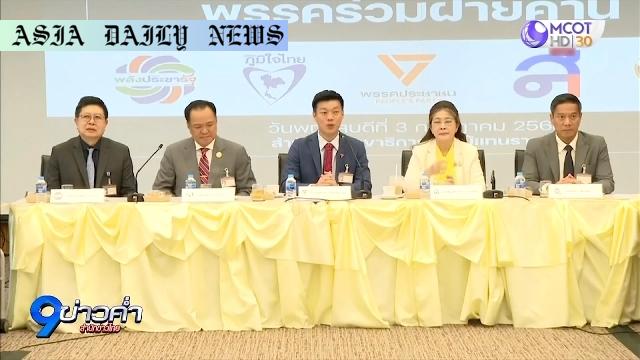Thai Opposition Parties intensify pressure on government after PM Paetongtarn Shinawatra’s suspension, pressing for early elections.

Escalating Political Turmoil in Thailand
Thailand is facing increasing political uncertainty as opposition parties, spearheaded by the People’s Party, have intensified their push for a resolution to what they perceive as governmental inadequacies. This comes in the wake of Prime Minister Paetongtarn Shinawatra’s suspension by the Constitutional Court following controversy over her handling of sensitive diplomatic matters. The ongoing unrest marks a significant challenge to the ruling coalition led by the Pheu Thai Party, which holds a slim majority in parliament.
Calls for Parliament Dissolution and New Elections
In a rare show of solidarity, opposition leaders, including those from the recently defected Bhumjaithai Party, convened to discuss the country’s future. They emerged from their meeting on Thursday with a clear demand: the dissolution of parliament and the scheduling of fresh general elections before the year’s end. People’s Party leader Natthaphong Ruengpanyawut spoke candidly about the need to prevent political deadlock, emphasizing the importance of finding a path that serves the nation’s interests in these challenging times.
The Fallout from PM Paetongtarn’s Suspension
Paetongtarn Shinawatra’s suspension has added fuel to the growing political unrest. Criticism has mounted since her leaked phone call with Cambodian Senate President Hun Sen, where her comments allegedly disparaged a Thai military commander. The implications of this diplomatic gaffe have been severe, not only for her political career but also for Thailand’s strained relations with neighboring Cambodia. While she retains her position as culture minister, the looming possibility of her complete removal adds further instability to an already volatile situation.
Opposition’s Strategy and Government’s Response
The opposition has strategically framed their demands as a response to what they view as the government’s inability to address pressing national issues, ranging from border disputes to economic woes. The dissolution of parliament and a shift toward new elections, they argue, will offer the necessary reprieve and reset for governance in Thailand. Meanwhile, the government, led by the Pheu Thai Party, has remained defensive, emphasizing their ability to navigate the crises despite their slim majority in parliament.
Potential Consequences for Thailand
The ongoing political impasse raises important questions about Thailand’s future. Prolonged instability could deter foreign investment, weaken public confidence, and exacerbate socio-economic challenges. If the opposition succeeds in forcing an early election, it may result in a dramatic shift in the country’s political landscape. However, such a move also carries risks, including the potential for prolonged political campaigns and further polarization of the electorate.
Conclusion: A Nation at a Crossroads
As Thailand wrestles with its internal political challenges, the coming months will likely prove pivotal in determining its trajectory. The opposition’s demands for action and the government’s response to mounting criticism will not only shape the immediate political outcome but also set the tone for the nation’s democratic processes in the years to come. The eyes of the nation—and indeed, the region—are on Thailand as its leaders navigate this complex and volatile period.
Commentary
Examining the Opposition’s Bold Move
The recent actions of Thailand’s opposition parties, particularly the People’s Party, underscore the urgency of the political situation in the country. The demand for early elections and the dissolution of parliament reflects a deep frustration with the current government’s perceived inability to address key national challenges. This unity among opposition parties is both strategic and significant, suggesting a coordinated effort to capitalize on the turmoil surrounding Prime Minister Paetongtarn Shinawatra’s suspension.
The Role of Leadership in Times of Crisis
Leadership, or the lack thereof, has become a central theme in Thailand’s unfolding political drama. Paetongtarn’s suspension, while rooted in specific allegations, highlights wider concerns about governmental efficacy and accountability. The controversial phone call with Cambodia’s Senate President revealed not only a potential lapse in judgment but also broader issues regarding diplomatic and military coordination. These are critical areas requiring steady leadership—something the opposition claims is currently lacking.
The Implications for Thailand’s Future
Thailand stands at a crucial juncture. The opposition’s call for action is not merely about immediate political gains but also about addressing longer-term issues of governance and public trust. However, the road ahead is fraught with challenges. Even if early elections are held, there is no guarantee that a more stable or effective government will emerge. The potential for heightened polarization remains a significant concern, as does the possibility of continued conflicts over key policy areas.
A Time for Reflection and Resilience
The unfolding drama in Thailand offers an opportunity for reflection not just for its leaders but for its citizens. What kind of leadership does the nation need at this juncture? How can the democratic process be strengthened to avoid repeated crises? These are questions that demand thoughtful consideration as the country navigates this uncertain period. Ultimately, Thailand’s resilience and commitment to democratic ideals will be tested as it seeks to overcome these challenging times.


